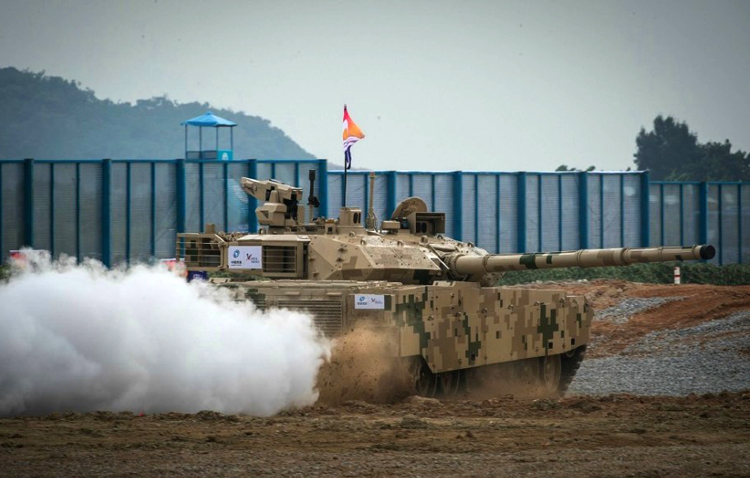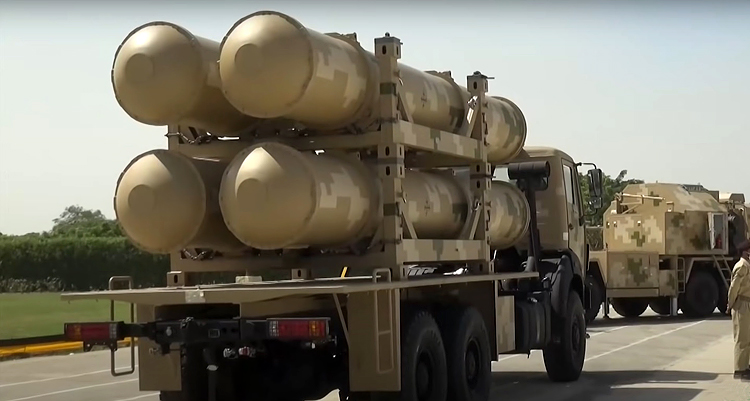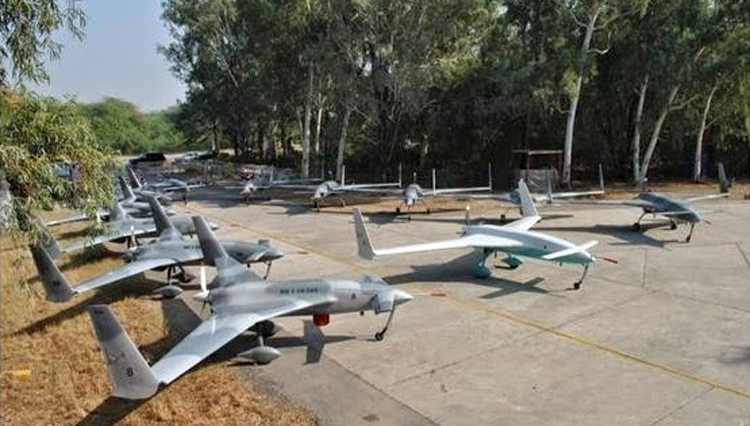INDIAN ARMED FORCES CHIEFS ON OUR RELENTLESS AND FOCUSED PUBLISHING EFFORTS

The insightful articles, inspiring narrations and analytical perspectives presented by the Editorial Team, establish an alluring connect with the reader. My compliments and best wishes to SP Guide Publications.

"Over the past 60 years, the growth of SP Guide Publications has mirrored the rising stature of Indian Navy. Its well-researched and informative magazines on Defence and Aerospace sector have served to shape an educated opinion of our military personnel, policy makers and the public alike. I wish SP's Publication team continued success, fair winds and following seas in all future endeavour!"

Since, its inception in 1964, SP Guide Publications has consistently demonstrated commitment to high-quality journalism in the aerospace and defence sectors, earning a well-deserved reputation as Asia's largest media house in this domain. I wish SP Guide Publications continued success in its pursuit of excellence.
- Prime Minister Modi Visits Punjab’s Adampur Air Base, Interacts with Airmen after Successful ‘Operation Sindoor’; Stern Message to Pakistan
- The layered Air Defence systems that worked superbly, the key element of Operation Sindoor
- Operation Sindoor | Day 2 DGMOs Briefing
- Operation Sindoor: Resolute yet Restrained
- India's Operation Sindoor Sends a Clear Message to Terror and the World – ‘ZERO TOLERANCE’
- Japan and India set forth a defence cooperation consultancy framework, talks on tank and jet engines
China-Turkey Arming Pakistan
A China-Pakistan-Turkey triad will be adverse for India both in the conventional and sub-conventional spheres, given that China-Pakistan and Turkey-Pakistan have already been collaborating at the sub-conventional level.
 |
The Author is Former Director General of Information Systems and A Special Forces Veteran, Indian Army |

China has accelerated arming Pakistan to consolidate the dual front against India. In July 2021, the Pakistan army formally inducted the first batch of Chinese VT-4 battle tanks into its armoury, Pakistan being the third country to import these tanks from China after Thailand and Nigeria. Produced by China’s state-owned armoured vehicle manufacturer, Norinco, China began delivery of the VT-4 tanks to Pakistan in April 2020. After field tests of the VT-4 tanks in September 2020, the Pakistan army issued a statement saying, “The VT-4 is compatible with any modern tank in the world integrating advanced armour protection, maneuverability, fire power capabilities and state-of-the-art technology.” Pakistan plans to induct 360 x VT-4 tanks.
Pakistan acquired 5 x CH-4 drones from China in early 2021. Two variants of CH-4 are in service with the People’s Liberation Army (PLA) - CH-4A primarily for reconnaissance missions and strike-capable CH-4B carrying 345 kg weapon payload with flight endurance of 14 hours.
On October 14, Pakistani Army Chief General Q.J. Bajwa witnessed commissioning of the Chinese-origin HQ-9/P HIMADS (high to medium air defence system) into Pakistan’s army at the Army Air Defence Centre in Karachi. HIMADS will enhance Pakistan’s Comprehensive Layered Integrated Air Defence (CLIAD) shield. The system can intercept aircrafts, cruise missiles and beyond visual range (BVR) targets at ranges over 100 km with single shot kill probability. It is considered a strategic long range surface to air missile combining flexibility and precision. Speaking on the occasion in presence of Chinese officials, Bajwa said Pakistan–China strategic partnership and defence collaboration is a factor of stability in the region.

In December 2020, Chinese media publicised Beijing’s decision to supply 50 x Wing Loong II armed drones to Pakistan, which it claimed would be a nightmare for Indian ground formations in high-altitude areas (sic). There has been no further news of delivery of Wing Loong II drones by China to Pakistan. However, Pakistan acquired 5 x CH-4 drones from China in early 2021. Two variants of CH-4 are in service with the People’s Liberation Army (PLA) - CH-4A primarily for reconnaissance missions with flight endurance of 30 hours, and; strike-capable CH-4B carrying 345 kg weapon payload with flight endurance of 14 hours. China has also supplied CH-4 drones to Iraq, Saudi Arabia, UAE, Myanmar and Jordan. China and Pakistan are also reportedly discussing co-production of Chinese CH-5 drones. Pakistan’s ‘Burraq’ drone though claimed indigenous is with Chinese assistance; a copy of China’s CH-3 and Burg missile similar to AR-1 missile of CH-3 drone.

China-Pakistan defence cooperation during 2019-2020 included: China proposed supply of 1265 x FN-16 (including two missiles for live firing trials) Man Portable AD Systems (MANPADS), 14 x Launching Mechanisms, 2 x Man Portable Missile Launchers, accessories, spares and tools costing $28,998,390; Pakistan army evaluated Chinese Track Mounted Gun SH-15 gun. Pakistan had already procured 36 SH-1 MGS and planned to procure 36 more MGS; China proposed re-life for Pakistan’s 1st & 2nd battery of A-100 MLRS in December 2019 and March 2022, and; media reports of July 2020 revealed China’s Wuhan Institute of Virology signed covert deal with Pakistan military’s Defence Science and Technology Organisation (DESTO), for research collaborating in “emerging infectious diseases” and Studies on Biological Control of Vector Transmitting Diseases.

Forming the Triad with China and Pakistan is Turkey, who had signed a contract with Pakistan in 2018 to upgrade the Agosta 90B submarines in service with the Pakistan Navy. Turkey is also helping Pakistan for designing and constructing new Corvettes and oil tankers. Also in 2018, Turkey and Pakistan agreed on the sale of a batch of 30 Turkish-made T129 ATAK multirole combat helicopters. Turkish government stated this was largest-ever Turkish-Pakistani defence contract. Before the deal, the T129 went through various tests in Pakistan and was showcased at Pakistan’s National Day military parade. However, this sale of T129 was blocked by the US in 2021 because the engine on the helicopter is American and the US holds the export clearance for the LHTEC engines.

In July 2021, Pakistan's President Arif Alvi conferred the Nishan-e-Imtiaz on General Umit Dundar, Commander of Turkish Land Forces in Islamabad. Earlier in April 2021, Turkish Armed Forces had awarded General Nadeem Raza, Pakistan’s Chairman of Joint Chiefs of Staff Committee, the Legion of Merit for his services in promoting defence relations between the two countries. Pakistan is seeking armed drones from Turkey, especially the ‘Bayraktar’ TB-2 drones, as both countries have aligned on Pakistan’s contention over Kashmir and Afghanistan. During 2020, Pakistan and Turkey had sent mercenaries to assist Azerbaijan defeat Armenia in the Nagorno-Karabakh conflict in which the TB-2 armed drones had played merry hell in Armenian defences.
Reports of July 2020 revealed China’s Wuhan Institute of Virology signed covert deal with Pakistan military’s Defence Science and Technology Organisation (DESTO), for research collaborating in “emerging infectious diseases”
Turkey is pushing to co-manufacture military aircraft and missiles with Pakistan with the additional aim of accessing Chinese military technology. The last round of Turkey-Pakistan talks on the issue of co-manufacture was held in January 2021. Turkey views Pakistan as strategic ally and potential partner in building its Siper long-range missile-defence project and TF-X fighter jet. Pakistani Defence Secretary Mian Muhammad Hilal Hussain had met his Turkish counterpart and Defence Minister Hulusi Akar in December 2020 for discussing defence industry cooperation. Akar had also met Pakistan’s Defence Minister, Military Chief and Air Force Chief when Turkish President Erdogan visited Pakistan last year.

Turkey wants to use its Pakistani links to get to Chinese military technology, particularly in missiles (both conventional and nuclear) and fighter aircraft. A China-Pakistan-Turkey triad will be adverse for India both in the conventional and sub-conventional spheres, given that China-Pakistan and Turkey-Pakistan have already been collaborating at the sub-conventional level.
In 2018, Turkey and Pakistan agreed on the sale of a batch of 30 Turkish-made T129 ATAK multirole combat helicopters. Turkish government stated this was largest-ever Turkish-Pakistani defence contract.
Additionally on September 30, the Pakistan Navy inducted its first new long-range maritime patrol aircraft (dubbed ‘Sea Sultan’), converted from a Lineage 1000 passenger jet built by Brazil's Embraer, in a ceremony at the PNS Mehran naval base at Karachi. The Embraer Lineage 1000 is a business jet, which can carry around 20 passengers and has a maximum range of 4,400 nautical miles (8,149 km). The Pakistan Navy announced it had contracted to buy two more aircraft of the same series, which would be equipped with "latest weapons and sensors to undertake maritime air operations". Pakistan selected the Embraer jet to replace its fleet of 9 x US-built P-3 Orion turboprop aircraft, which first entered service in the mid-1990s.
The Indian Navy currently operates 10 Boeing P-8I maritime patrol jets and will eventually have a total fleet of 18 such aircraft. Jet-powered maritime patrol aircraft are faster than turboprop aircraft. Moreover, given their commonality with commercial aircraft in terms of engines and spare parts, jet aircraft offer lower operating costs. The P-8I has a maximum take-off weight of nearly 85 tons almost twice that of the Embraer Lineage 1000, thus having capability to carry a greater weapons load. Moreover, the P-8I benefits from an assured flow of technology and support from the US Navy and Boeing, unlike the Sea Sultan.





